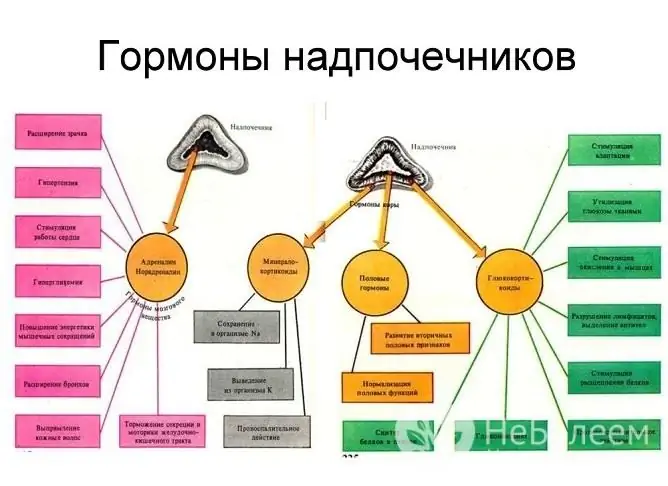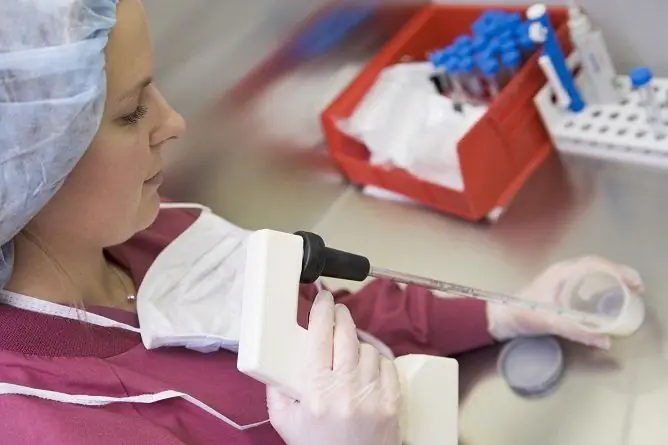- Author Rachel Wainwright [email protected].
- Public 2024-01-15 19:51.
- Last modified 2025-11-02 20:14.
Adrenal hormones and their functions in the body
The content of the article:
- What hormones are produced by the adrenal glands
-
What functions do catecholamines have?
- Adrenalin
- Norepinephrine
- Dopamine
-
The role of corticosteroids in the body
- Glucocorticoids
- Mineralocorticoids
- Functions of androgens in the human body
- Video
Adrenal hormones are vital biologically active substances that control many processes in the human body, play an important role in the regulation of metabolic processes, the body's adaptation to adverse conditions, in particular, in stressful situations.

Determination of the concentration of the listed hormones in the blood is required in the following cases:
- If you suspect the presence of adrenal gland diseases or some other pathologies.
- To control the ongoing treatment.
- During a preventive medical examination.
Before the analysis, it may be necessary to cancel the drugs used, which include substances that affect the synthesis of hormones.
Only a doctor can decipher the analysis results. Only a qualified specialist should prescribe treatment (if necessary).
What hormones are produced by the adrenal glands
The adrenal glands, or adrenal glands, are the paired glands that are located above the top of the kidneys. They consist of cortex and medulla. The adrenal medulla produces the hormones adrenaline, norepinephrine, dopamine (catecholamines). The medulla is the main source of catecholamines in the body.
The adrenal cortex consists of several layers:
- glomerular zone;
- beam zone;
- mesh area.
The table lists the names of the hormones that are secreted by the adrenal glands.
A list of hormones that are synthesized by different parts of the adrenal glands:
| Structural part of the gland | Produced hormones | Hormone names |
| Medulla | Catecholamines | |
|
Cortex: glomerular zone - mineralocorticoids: bundle zone - glucocorticoids |
Corticosteroids |
Mineralocorticoids: corticosterone, aldosterone, deoxycorticosterone. Glucocorticoids: cortisol, cortisone |
| Mesh area of the cortical layer | Sex hormones | Androgens |
What functions do catecholamines have?
Catecholamines include dopamine, adrenaline, and norepinephrine, which are synthesized in the brain and adrenal medulla. They are derivatives of amino acids (like the thyroid hormones thyroxine and triiodothyronine). Catecholamines take part in increasing the activity of the endocrine glands, normalize the functioning of the nervous and cardiovascular systems, and affect thermogenesis.
With mental and some other diseases, there may be a lack of catecholamines. With intense mental and physical work, the level of catecholamines in the blood rises. In stressful situations, the medulla releases significantly more catecholamines.
Adrenalin
Adrenaline is produced by neuroendocrine cells and is the main hormone in the adrenal medulla.
The functions of the adrenal hormone adrenaline include:
- increased blood pressure;
- increased heart rate;
- regulation of the metabolism of carbohydrates (enhances the conversion of glycogen into glucose, inhibits the formation of glycogen) and fats (enhances their breakdown and inhibits synthesis);
- relaxation of smooth muscles of the intestines, bronchi;
- dilated pupils;
- narrowing of blood vessels of the skin, mucous membranes, abdominal organs, to a lesser extent - skeletal muscles;
- expansion of the vessels of the brain;
- hemostatic, anti-inflammatory and anti-allergic action;
- increases the level of wakefulness, mental activity.
The production of adrenaline increases with burns, trauma, shock. Its products stimulate a sense of danger, fear, extreme cold.
Prolonged exposure to high concentrations of adrenaline promotes increased protein catabolism, can lead to a decrease in muscle mass, depletion.
Norepinephrine
Norepinephrine is a catecholamine that is a precursor to adrenaline. Refers to the most important mediators of wakefulness. Its functions:
- participates in the regulation of blood pressure;
- increases muscle strength;
- can provoke outbursts of aggression.
In comparison with adrenaline, norepinephrine has a stronger vasoconstrictor effect, a small effect on the contraction of the heart muscle, a less pronounced effect on smooth muscles, and also a lesser effect on metabolism.
Production increases in stressful situations, intense physical exertion, bleeding, injuries, burns, nervous tension, fear.
Dopamine
Dopamine is a precursor to norepinephrine. It is produced in large quantities during a positive (according to the subjective assessment of a person) experience, which can include pleasant tactile sensations, the use of delicious food, etc.
Dopamine in the body:
- influences learning processes, causing satisfaction from positive experiences;
- causes the development of pleasure;
- improves blood flow;
- increases the concentration of glucose in the blood and inhibits its utilization by tissues;
- helps to relax the lower esophageal sphincter;
- inhibits peristalsis;
- participates in the implementation of vomiting.
An excess of dopamine in the blood is noted under the same circumstances in which the concentration of adrenaline and norepinephrine increases, as well as with a deterioration in the blood supply to the kidneys, an increased level of aldosterone and sodium in the blood. A significant increase in the concentration of dopamine in the blood may indicate the presence of hormone-active tumors in the patient.
Insufficient synthesis of dopamine leads to the development of Parkinson's syndrome. Dopamine deficiency can lead to a person ignoring negative experiences in the learning process.
The role of corticosteroids in the body
Corticosteroids are a subclass of steroid hormones that have glucocorticoid and / or mineralocorticoid activity. Depending on the predominance of one or another type of activity, they are, respectively, subdivided into glucocorticoids and mineralocorticoids.
Glucocorticoids
Glucocorticoids in the body:
- stimulate the production of glucose and amino acids (gluconeogenesis);
- have a depressing effect on allergic and inflammatory reactions;
- increase the excitability of the nervous system;
- reduce the proliferation of connective tissue;
- have a strong anti-stress and anti-shock effect;
- are able to increase the level of blood pressure, the sensitivity of the heart muscle and the vascular wall to catecholamines;
- stimulate erythropoiesis, neutrophilopoiesis, inhibit eosinophilopoiesis;
- reduce tissue sensitivity to insulin;
- have an immunoregulatory effect.
Cortisol is the most active glucocorticoid in the human body, which plays an important role in the formation of the body's defense reactions (to hunger, stressful situations), and is involved in many metabolic processes.
During pregnancy, the concentration of cortisol in the blood can increase by 2-5 times. The increase in cortisol levels during this period is physiological, not pathological. Permanently elevated levels of cortisol can be observed with frequent stressful situations.
Mineralocorticoids
Mineralocorticoids have a strong effect on water-salt metabolism. Under their influence, there is an increase in the volume of circulating blood, an increase in systemic blood pressure. In pathological cases, this can lead to the formation of edema, arterial hypertension, congestive heart failure.
The most active mineralocorticoid in humans is aldosterone. Its functions:
- causes a delay in the excretion of sodium (Na) and chlorine (Cl) from the body, increases the excretion of potassium (K) by the kidneys;
- influences muscle tone, heart rate.
An increase in the concentration of aldosterone in the blood can lead to disturbances in the work of the heart, a decrease in muscle tone, and seizures.
A reduced content of aldosterone in the blood can be observed after prolonged illness, chronic stress, and the presence of neoplasms. At a low concentration of aldosterone, blood pressure decreases, and symptoms of cardiac pathologies may appear.
Functions of androgens in the human body
Sex hormones androgens are produced by the adrenal cortex and gonads (testes in men and ovaries in women), they are active before and after puberty, including taking part in the development of secondary sexual characteristics in both men and women. The main androgen is testosterone, in the synthesis of which zinc (Zn) plays an important role.

Testosterone is produced not only in men but also in women
Androgens in the body:
- increase sex drive;
- have a pronounced anabolic effect, including increasing muscle mass;
- increase the production of proteins, slow down their breakdown;
- stimulate the utilization of glucose by cells, reduce its concentration in the blood;
- reduce the concentration of high density lipoproteins in the blood and increase the level of low density lipoproteins.
An increase in the level of androgens in women can lead to an increase in the labia and clitoris, partial atrophy of the uterus, ovaries, mammary glands, and menstrual irregularities. Hormonal imbalance can cause infertility, excessive male-pattern hair growth, increased sebum production, and aggressive behavior. In men, excessive production of androgens leads to alopecia, increases the risk of developing prostate cancer.
The lack of androgens causes problems with sexual development in children and adolescents, and in adults it leads to a decrease in libido, erectile dysfunction.
Video
We offer for viewing a video on the topic of the article.

Anna Aksenova Medical journalist About the author
Education: 2004-2007 "First Kiev Medical College" specialty "Laboratory Diagnostics".
Found a mistake in the text? Select it and press Ctrl + Enter.






